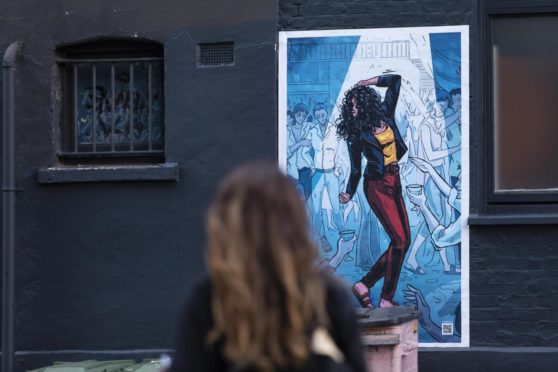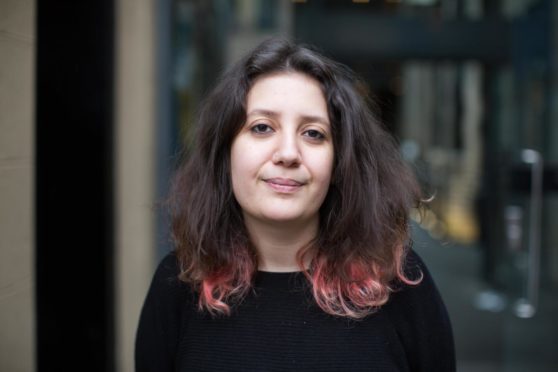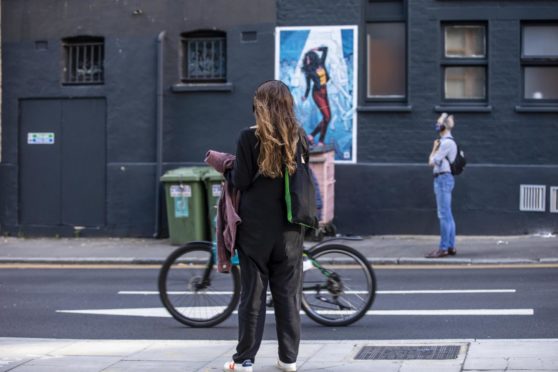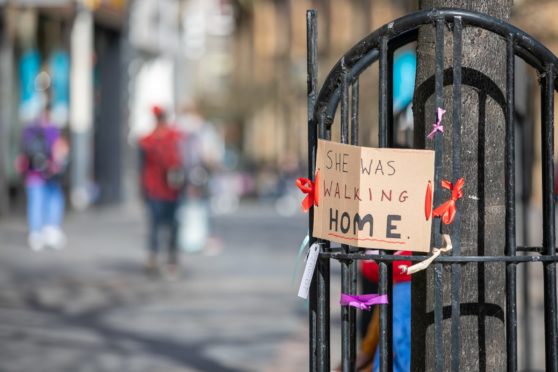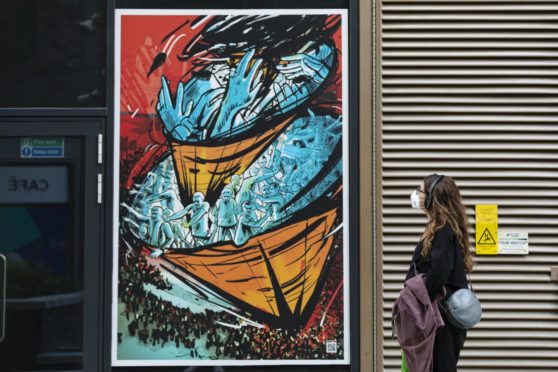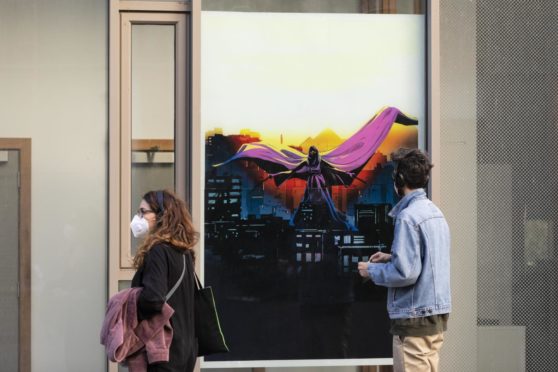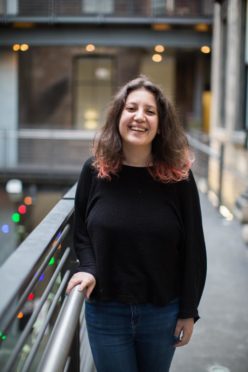Cheerful, polite, articulate and calm – playwright Sara Shaarawi is such an angry feminist.
It’s early on a Tuesday morning when we Zoom (I reckon it’s a verb now) to chat about Glasgow-based Sara’s new multimedia play – the wryly-titled Niqabi Ninja.
The play, an immersive audio-performance which combines street art and storytelling, is running in five Scottish cities simultaneously – Dundee, Aberdeen, Inverness, Edinburgh and Glasgow, on August 27 and 28.
It is directed by Catrin Evans and the Dundee performances are being staged by Dundee Rep Theatre.
Niqabi Ninja follows the story of Hana, a Cairo-born illustrator who creates the character of vigilante “Niqabi Ninja” as she traces a pattern of gender-based violence she has experienced, from her first catcall to a traumatic attack.
And in keeping with the title’s teetering balance of activism and entertainment, Sara herself is upbeat, even as we dig into the work’s heavier themes – misogyny, sexual assault and state violence in Egypt’s 2011 revolution.
It’s clear that for Sara, this is not a venting exercise. It’s work.
Talking about a revolution
“I wrote the play a long time ago, in 2013,” Sara says, explaining that what started as a 20-minute monologue written in a day grew into the performance showing next month. “At the time, we were well into the sort of post-revolution, post-uprising era in Egypt, but there was still a lot of demonstrations happening.
“From the first uprising, there was a demonstration almost every Friday, and if things got violent, they would stretch out and people would just stay there for a few days.
“And in these demonstrations, the bigger ones… at the end of 2012, testimonies came out that women were being sexually assaulted by mobs of men.” Sara keeps her voice level, which is no small feat given what she says next.
“Huge groups of men, with isolated women. And they’d rape them. And I was so angry.
“I just felt rage, more than anything. Because the testimonies were so difficult to read, they were horrifying.
For Sara, the horror didn’t stop at the atrocities the women faced, but continued as she witnessed the social conversation around the testimonies.
“I couldn’t believe these women had to do that in order for society to believe them.
“There were people saying they were lying, or it was an exaggeration. There was a lot of in-fighting, in terms of what the revolution represented,” she sighs. “And so there was a lot people just making (the attacks) fit into their agenda.
“This connects to a wider societal problem of all the little behaviours that we’ve normalised, where we’ve said it’s OK for men to act a certain way.
“And then of course in extreme time, those behaviours that we’ve normalised become extreme as well.”
Fighting back: Niqabi Ninja
For Sara, tracing that extreme behaviour back to its “normal” roots is key to understanding (and fighting against) gender-based violence. Enter: Niqabi Ninja.
“I wanted to create a character who starts to connect all these behaviours,” she explains.
“There’s a through-line between the first catcall she experiences to this incident of extreme violence.
“And everything in between – whether it’s groping, or being scared on public transport that someone’s going to expose themselves… you know? All of these things that we’ve made normal.” (I do know. I think we all do.)
“And we’ve put the responsibility on women to protect themselves while we all know that, no matter how many precautions you take, it’s still luck that you’re not hurt,” Sara goes on.
“If you’re walking in the street or just in a public space – it is always, a little bit, at your own risk.”
She’s right of course. One only needs to look at the worldwide furore around London woman Sarah Everard’s murder earlier this year to see how prominent women’s safety – or the lack thereof – has become in the public consciousness.
Closer to home, in Dundee, the play will walk the routes recently plastered with “Reclaim the Street” placards.
Long before Covid and lockdowns, women have felt the risk of simply leaving the house.
Indeed, even in her own limited experience of the demonstrations in her home city of Cairo, Sara has glimpsed the darkness and violence first-hand.
“I’ve not had great times at them,” she states matter-of-factly. “There was one experience in particular where there was an incident. I think I experienced a sort of testing ground for what other people went through later.
“I was fine, nothing happened – but I was touched inappropriately. And it was scary.
“It’s only luck that it didn’t happen to me, you know? It could have been me.”
Taking back the streets
Already staged in Uganda and South Africa, Sara’s play was due to make its full UK stage debut this year.
But in response to the logistical demands of the pandemic, it was reimagined as an outdoor walking experience told through headphones and street art, adding a new dimension to the themes at its heart – namely women’s safety in public space.
Uniquely, the experience of the play will be dependent on the city in which one goes to see it, since the walking routes are literally shaped by their cityscapes.
So is it, I ask, the intention to up the ante of the audience’s emotional response by placing them in the space the play itself deems unsafe?
“We had a lot of chat about this,” Sara begins. “I’m really interested in public space, and how public space can be in conversation with art. But I’m not interested in putting people in a vulnerable position.
“So we put a lot of effort into making sure people feel comfortable doing it. We make sure we give them numbers to call if they got lost. We make sure to tell them that if they don’t want to continue, they can stop.
“We mark all where the crossing are on the map, we mark seating. We have a safe space where people can chat about the work afterwards. We tell people not to come on their own, we’re really encouraging people to come with friends. We really don’t want people to fell vulnerable.
“But,” she goes on,”I am interested to see, by putting it in public space, and with it being about women’s safety in public space, how the real world starts to affect the narrative. Particularly for people who don’t have to deal with that daily threat all the time – cisgender, hetero-normative men basically.
“I’m very interested in their response particularly. Putting them in a public space while listening to the narrative – is that going to suddenly open things up a bit for them, or give them a different perspective?”
Not all heroes wear capes – but some do
It would be easy to be intimidated by the rage inherent in the play, but that isn’t Sara’s intention.
“I feel like in the UK, anger here can get so aggressive,” she observes. “There’s a sense that it’s just one tone. But for me, I think there’s a journey to it, and it’s many tones.
“And I want to honour that rage, because it’s where the play came from.”
We’re darkness yes, but also light.”
The beauty of Niqabi Ninja is that despite its heavy subject matter, it’s funny – it’s a superhero story, after all.
“Niqabi Ninja, the character, is sort of the comic book element, that kind of fantastical bit. And it’s the framework that gives enough distance to be able to look at the violence. Because I think it is important to look at the violence, but I don’t want to be exploitative; I don’t want to be making what people call ‘trauma porn’.
“Particularly with where I’m from, and that part of the world… the UK has a really narrow vision of what we’re like and what our lives are like.
“I definitely wanted to bring humour because… well, Egyptians are just so funny. There’s a lot of really oppressive structures and violence, but there’s also so much joy and so much humour. We laugh at everything!
“And not as a way to undermine. It’s not making light of a heavy subject, it’s just part of it, you know? We’re human, we’re not just darkness. We’re darkness yes, but also light.
“Particularly at the time I was writing the play, it was ‘terrorist, revolutionary, refugee’.” She karate-chops her palm, ninja-style, to punctuate each one.
“Those were the categories we existed in. And I wanted to subvert that a bit, and create a character that was visible from that part of the world, visibly Muslim, but is absolutely f****** hilarious! And fun, and badass!”
If she’s anything like the playwright herself, I have no doubt she will be.
Tickets for Niqabi Ninja can be purchased from hosting venues or the Lyceum website.
